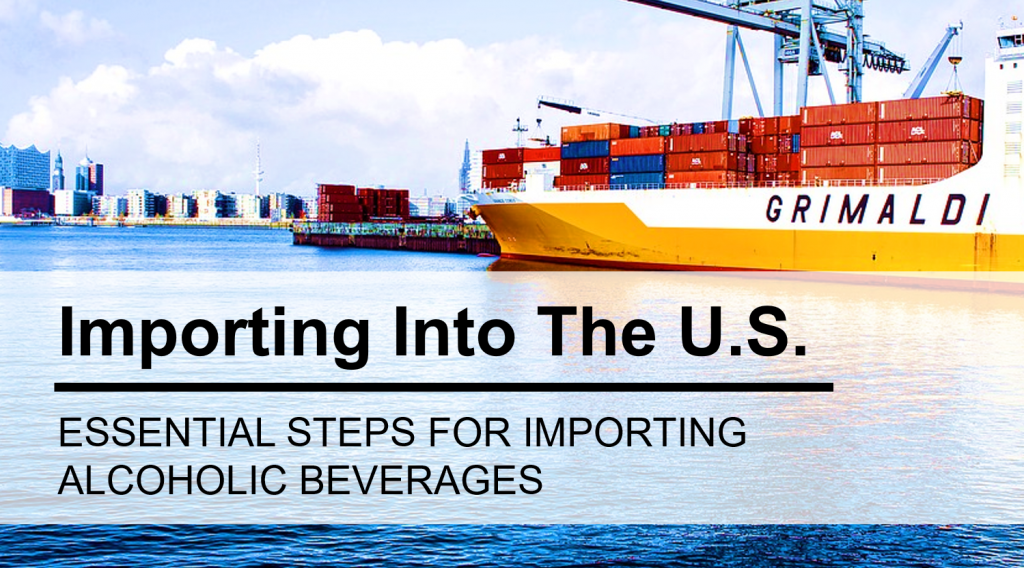If you’re thinking about importing alcohol into the United States, becoming familiar with the legal environment and accompanying rules and regulations is essential.
Imported alcoholic beverages fall under the rulings of the Alcohol and Tobacco Tax and Trade Bureau (TTB), the Federal Food and Drug Administration (FDA) and the Customs and Border Protection (CBP). Understanding the requirements from each of these agencies and the timeline for completing those requirements is vital for successfully importing an alcoholic beverage into the U.S.
How to Import Liquor Into the United States
To import alcoholic beverages into the US, one needs to secure specific permits from the Alcohol and Tobacco Tax and Trade Bureau (TTB). The required forms can be filled out online, which streamlines the process of applying for importer’s and wholesaler’s permits. The Alcohol and Tobacco Tax and Trade Bureau website is the best place to get started.
More detailed steps on how to import your alcoholic beverage into the U.S. are outlined below.
1. Approve Your Formula
TTB evaluates the ingredients of certain alcoholic beverages before allowing them inside the country or accepting their labels. There are unique TTB formula requirements for distilled spirits, malt beverages and wine. Consult a company that offers beverage formulation services to expedite the process and ensure the formula’s accuracy.
2. Get Your Permits
Anyone who wants to import distilled spirits, wine or malt beverages into the U.S. must apply for a Federal Basic Importer’s Permit by submitting the appropriate forms to the National Revenue Center online or on paper. You can submit the documents for free. Some U.S. states require proof of your Importer Permit on a commercial invoice. You can expect to wait approximately six weeks for your permit.
To be eligible for a permit, you must maintain and staff a business office in the United States or contract with an existing U.S. licensed importer. You will also be required to present a Letter of Intent from a Foreign Supplier. The Letter of Intent is a legal document that states you fill supply your beverage to your importer inside the U.S. border.
You may also need to apply for a Wholesaler’s Basic Permit if you plan to sell large quantities of your beverage to a retailer or another wholesaler.
3. Obtain a COLA for Each Product
You must possess a TTB-issued Certificate of Label Approval (COLA) for each unique product/label for distilled spirits, wine or malt beverages at the time of importation. You can apply for a COLA after receiving your Importer’s Permit. Depending on the product, you may also need to obtain pre-COLA product approval. Pre-COLA product evaluation entails a review of a product’s ingredients and formulation and also may include laboratory analysis of the product.
COLAs ensure that distilleries, wineries, breweries and importers comply with federal regulations when marketing and designing labels for their alcoholic beverages. The TTB lays out specific information that any advertisement must contain. There are unique requirements for wine, distilled spirits and malt beverages. You can request TTB’s free, voluntary pre-clearance service to ensure your advertisements provide the necessary information. There are unique TTB label requirements for distilled spirits and malt beverages.
4. Prepare Funds for Taxes and Duties
Importers are responsible for paying all Federal Excise Taxes (FET) and duties to U.S.
Customs and Border Protection (CBP) as defined in the Internal Revenue Code. The CBP also collects all applicable duties. Taxes and fees vary depending on circumstances, but you can see an overview of fees by product category on the TTB’s website.
What is the import tax on alcohol?
The import tax on alcohol varies depending on the type of drink. Generally, duty rates on beer and wine remain low, approximately $1-2 per liter, while fortified wines and spirits attract significantly higher rates. Duty rates can be found in Chapter 22 of the Harmonized Tariff Schedule, titled “Beverages, Spirits and Vinegar”. On top of the import duty, federal IRS excise tax is also levied on these imports.
5. Find Out If You Need a Certificate of Age and Origin
You will need to obtain a certificate of age or origin for certain wines and distilled spirits imported into the United States. A Certificate of Age and Origin identifies the nation importing the beverage and when it was produced. The Certificate of Age and Origin requirements for imported alcoholic beverages webpage provides a list of the certificate of age and origin requirements.
Some requirements vary between countries, especially for those that request that the U.S. Government require a certificate of age and origin from its brands. For example, Canada asks the U.S. to require Certificates of Age and Origin for brands that export Canadian Whiskey and a few other beverages. France asks the U.S. to check a Certificate of Origin when French businesses send Champagne, Cognac and Armagnac.
If the alcohol you are importing is produced from products grown in more than one country, obtaining the certificate might involve further reviews from the TTB, FDA or CBP.
Note that importers of natural wine must comply with additional certification requirements to ensure that the imported wine is produced using proper cellar treatment.
6. Provide Prior Notice to the FDA
An importer of alcoholic beverages is also required to provide prior notice to the FDA. The FDA must be notified in advance of any shipments of food that are imported into the U.S. unless the product is exempt from prior notice. This prior notice gives the FDA time to review and evaluate information before the product arrives, prepare resources for inspections, and help intercept contaminated products.
The FDA Prior Notice number must be present on the waybill during shipping. The waybill’s description field for the product must also read, “Contains Alcohol — Signature of a Person Age 21 or Older Required for Delivery.” The FDA Prior Notice is also necessary when creating a commercial invoice. Print an FDA Prior Notice form with an itemized list of commodities, then attach the form to the commercial invoice.
7. Prepare Your Paperwork for Customs
The CBP will require that you have all necessary TTB permits and documentation, as well as the invoices for each import shipment and an entry form and entry summary. Each invoice must have the name of the importer, exporter, port of entry, number, weight, price and a detailed description of the product you are importing. Without this information, customs may not permit entry of your product. You will need to pay the assessed taxes and import duties before customs releases your product.
Another document to provide is an importer or customs bond. These bonds show that the importer will pay all necessary FET taxes and fees to the CBP. The CBP will only release products after receiving the required payment from the importer. Your importer can apply for the bond through a broker or surety that will cover the payments. The importer then reimburses the surety or broker.
8. Make a Plan for Transloading
Transloading is the process of moving your beer, wine or liquor from one mode of transportation to the next. Exporting a beverage from your nation and importing it to the U.S. involves numerous forms of transportation. Following various alcoholic beverage transportation regulations within the U.S. complicates this process.
Each state has its own rules and regulations surrounding imported alcohol, and there may be additional requirements you need to meet before moving your product from the point of entry. Between the numerous transportation modes your beverage will encounter and the many state regulations it will be subject to, it’s a good idea to map out the warehousing and shipping requirements necessary for each product to reach its final destination.
9. Verify That the Import Customer Meets All Requirements
The U.S. customer purchasing your alcoholic beverage must also meet certain requirements. Verifying that your customer does its due diligence will ensure the sale goes through. Import customers inside the U.S. must provide:
- Power of Attorney
- COLA waiver
- Federal Basic Permit
- State-issued alcohol permit
- Certificate of Age or Origin
Build an Import Strategy With MyDrink Beverages
Importing alcoholic beverages into the U.S. can seem like a daunting process, but following these steps can help minimize surprises and avoid unnecessary costs and delays.
Many alcoholic beverage brands outside of the U.S. choose to outsource the importing process. Importing services resolves many of the challenges that come with reaching customers in the U.S. market. MyDrink Beverages and our parent company, BevSource, offer customized solutions and support to help you develop the import strategy that makes the most sense for your company and product.
Our expert consultants fulfill many importing tasks on your behalf to ensure accurate and timely completion. Please contact us to learn more about our alcoholic beverage importing services.


